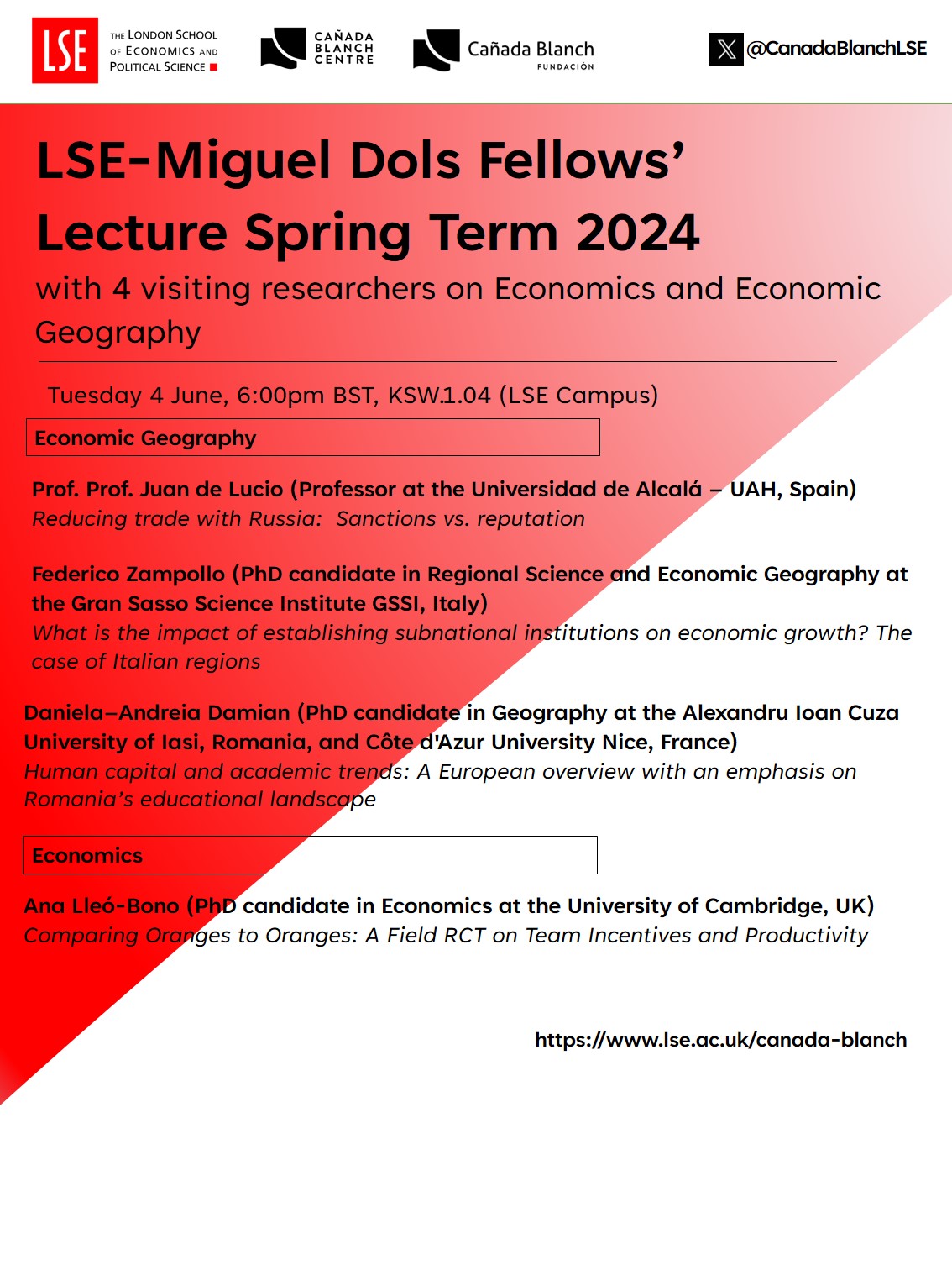Each term the Cañada-Blanch Centre at LSE organises a Fellow Workshop in which its visiting LSE-Miguel Dols Fellows present their ongoing research.

Meet our speakers
Prof. Juan de Lucio, Professor at the Universidad de Alcalá – UAH and main researcher of the high-performance research group I4. He is specialized in the field of applied economics analysis.
Reducing trade with Russia: Sanctions vs. reputation
Federico Zampollo (in X, formerly Twitter), PhD candidate in Regional Science and Economic Geography at the Gran Sasso Science Institute (L’Aquila, Italy). Within his PhD research project, he investigates the interaction between local institutional quality and the geographical distribution of economic activities across Italian municipalities.
What is the impact of establishing subnational institutions on economic growth? The case of Italian regions
The composite and multifaceted nature of institutional quality has led scholars to employ a diverse array of proxies to assess its impact on economic growth. The ideal approach for such an evaluation is to examine the impact of novel subnational institutions, an endeavor seldom undertaken. Our contribution to the literature lies in exploring the direct influence of local institutions on economic development, leveraging the establishment of Italian regional governments in 1970. We combine unique, granular data on annual municipal population flows from 1958 with institutional quality proxies from Putnam et al. (1983). Using a geographical difference-in-discontinuity counterfactual framework, we causally assess the role of regional institutional quality in promoting long-term economic growth. This study enriches the broader discourse on decentralization and economic policy, providing valuable insights into the role of subnational governance structures in fostering economic prosperity.
Ana Lleó-Bono, PhD candidate in Economics at the University of Cambridge, UK. Her research focuses on topics such as productivity, team dynamics, and incentives, in particular, her PhD. thesis investigates the incentives’ structure of workers on the Spanish citrus industry.
Comparing Oranges to Oranges: A Field RCT on Team Incentives and Productivity
I collaborate with three large Spanish citrus producers, running a field experiment on the interaction of individual versus team incentives on the productivity of seasonal orange-picking farmers. Their salary structure induces a trade-off between quantity and work-quality, as they get paid by kilograms of product picked. Because fruits are picked too quickly, workers often scratch the peels or pick damaged fruits that cannot be sold, inefficiently increasing transportation costs and additional quality checks at the warehouses.As the salary structure is contextually constrained and the harvest quality is checked at the team level, I look at how competition-based team incentives may help find a middle point with this trade-off. Every four weeks, the team with the best percentage of work-quality receives a substantial award.In my theoretical model, I focus on the trade-off between multiple factors being included in the measure of productivity, presenting different incentives for each factor. I also explore further the incentives' effectiveness, theoretically and empirically, looking at behavioral aspects such as beliefs, risk-taking attitudes, social cohesion, and family ties.
Daniela-Andreia Damian, PhD candidate in Geography at the Alexandru Ioan Cuza University of Iasi, Romania, and Côte d'Azur University Nice, France. Her research explores the connection between human capital formation and academic trends in the European context, with a specific emphasis on the Romanian case.
This study investigates educational performance in European Economic Area (EEA) countries using data from the Programme for International Student Assessment (PISA) for the years 2018 and 2022, complemented by National Assessment Data for Romania at Local Administrative Unit (LAU2) level for the same years. Through a comparative analysis framework, the research examines variations in student performance across regions, seeking to identify the key determinants contributing to these disparities. Preliminary results reveal significant disparities in academic performance both between countries and within Romania, underlining the critical role of educational policies and socio-economic factors in shaping human capital.
The findings reinforce the need for cohesive educational strategies to promote equitable and high quality education across and within countries.
Meet our chair
Prof. Andrés Rodríguez-Pose is the Princesa de Asturias Chair and a Professor of Economic Geography at the London School of Economics. He is the Director of the Cañada Blanch Centre LSE. He is a former Head of the Department of Geography and Environment between 2006 and 2009. He is a past-President of the Regional Science Association International (RSAI) (2015-2017) and served as Vice-President of the RSAI in 2014. He was also Vice-President (2012-2013) and Secretary (2001-2005) of the European Regional Science Association.
More about this event
The Cañada-Blanch Centre at LSE is the vehicle to achieve the objective of the Fundación Cañada Blanch: developing and reinforcing the links between the United Kingdom and Spain. This is done by means of fostering cutting-edge knowledge generation and joint research projects between researchers in the United Kingdom, and at the LSE in particular, on the one hand, and Spain, on the other.
You can follow us in Twitter.
Or the speakers and chair, , Prof. Andrés Rodríguez-Pose.
From time to time there are changes to event details so we strongly recommend that if you plan to attend this event you check back on this listing on the day of the event